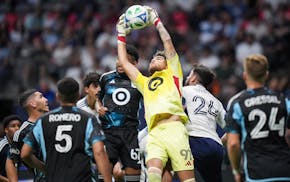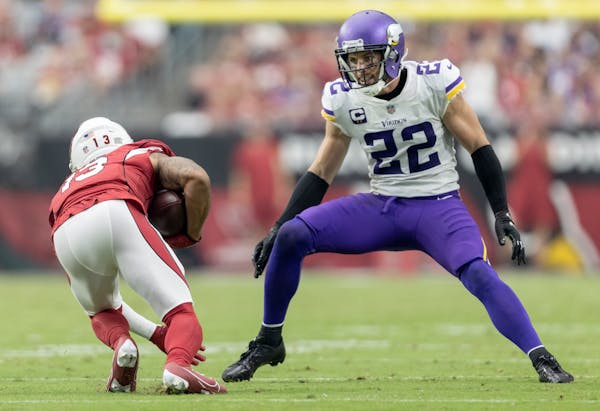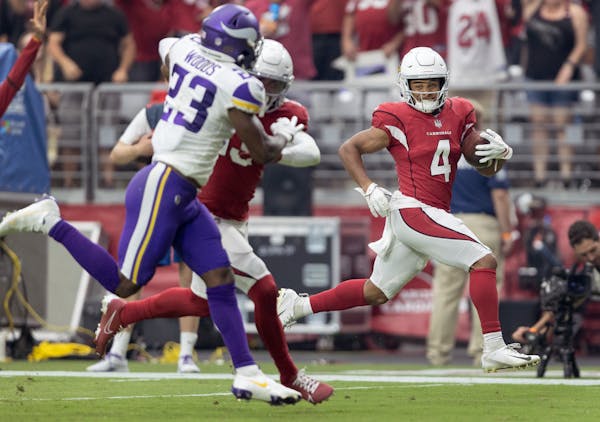During his sit-down with the Star Tribune's Mark Craig before the season, Mike Zimmer responded to a question about Greg Joseph's inexperience with an account of the Vikings' kicking struggles that sounded almost Zen in its acceptance.
"Not too nervous, really," Zimmer said in training camp. "Honestly. I've come to know that kickers are going to miss kicks. Since I've been here, we've missed kicks. It's not new."
In fact, during Zimmer's eight years as head coach, it's been more common for the Vikings than almost any team in the league.
The Vikings have the NFL's seventh-worst field goal percentage since Zimmer was hired in 2014, making only 80.9% of their kicks in regular-season and playoff games during that time. Of the six teams who have been worse, three (the Rams, Jets and Browns) are within half a percentage point of Minnesota.
And while the sample size on clutch kicks might be too small to draw any sweeping conclusions, the Vikings have missed a significant share of those, now including Greg Joseph's last-second wide-right kick in Sunday's 34-33 loss in Arizona. On field goal attempts to tie or take the lead in the final two minutes of regulation, they're tied for the second-worst percentage in the NFL (50%). They are 5-for-10 on those kicks, and have gone 2-for-4 in overtime; both misses were by Daniel Carlson against Green Bay at Lambeau Field in 2018.
The obvious question — why are the Vikings missing so many kicks? — seems difficult to answer definitively, given how many different kickers (as well as long snappers, holders and special teams coordinators) have been part of the process by this point.
Zimmer, of course, is the constant in that time, which leads to the popular hypothesis held by some in the league that the coach handles kickers in a way that makes them jittery. Carlson's success for the Raiders — after the Vikings cut him following those misses against the Packers in Week 2 of 2018 — often comes up as evidence, given the fact he has hit 88.1% of his field goals and 96.4% of his extra points for them.
Blair Walsh hit 89.7% of his field goals and 98.8% of his extra points in 2012 and 2013, before dropping to 80% and 90.5% under Zimmer the next three years (though the NFL moved its extra-point distance back 12 yards in 2015). But Carlson also had his struggles with the Raiders, making just 73.1% of his field goals in 2019, and Joseph went from drilling a 53-yard game-tying kick a week ago to missing from 37 and an extra point on Sunday. It's hard to imagine he wasn't confident heading into the week after the big kick he made against the Bengals.
"If anything, making some of those longer kicks showed me and everyone that I'm capable of making the shorter ones as well," Joseph said. "Just have to do a better job of executing next time."
Joseph said Monday he wasn't terribly familiar with the Vikings' fraught kicker history, and in the end, pointing to any one reason for the Vikings' kicking struggles is difficult to support with data. If anything, perhaps the level of turnover in the Vikings' special teams operation over the years has played a part in the inconsistency, and decisions like cutting Kai Forbath for Carlson in 2018 (or letting go of Carlson after the Packers game) might appear hasty in hindsight.
Zimmer said after the game Sunday that Joseph "needs to be more consistent," though he stopped short of saying the Vikings would consider changing kickers. "I mean, I don't think you should make a decision today on things like that," he said. "You know, I don't think you make decisions on personnel right after a guy misses a kick."
On Monday, he stepped back even further. "I mean, lots of kickers miss field goals. Let's give the kid a break, OK?" Zimmer said.
He has come by that perspective the hard way. And as the Vikings prepare for their home opener on Sunday — and the Seahawks come to Minnesota for the first time since the NFC wild-card game of the 2015 season (you know, the one with that field goal) — their fickle history with kickers is again top of mind.
TWO PLAYERS WHO STOOD OUT
Kirk Cousins: He started his 49th game for the Vikings on Sunday, passing Wade Wilson for the fourth-most quarterback starts in franchise history. Though Kyler Murray provided many of the biggest moments in the Cardinals' 34-33 victory, Cousins marked the occasion with the kind of efficient performance that might represent the quarterback at his best.
He completed 22 of his 32 passes for 244 yards and three touchdowns, finishing fifth among Week 2 starting quarterbacks with 0.28 expected points added per play. Cousins was sacked just once, didn't turn the ball over and made a surprising number of plays with his feet, scrambling twice for 35 yards and rolling left to hit Justin Jefferson for a 14-yard touchdown in the second quarter. With the game on the line, Cousins connected on six of his final eight throws, passing for 58 yards to set up Greg Joseph's field goal attempt.
It was the 27th time in Cousins' 49 starts he's posted a passer rating of 100.0 or better. The Vikings are 19-7-1 in those games, but they are 0-2 this season. The only time Cousins has posted a higher rating in a loss than the figure he put together Sunday (122.4) was last Nov. 22 against Dallas.
Danielle Hunter: As the Vikings pressured Murray in the second half, no one was more disruptive than Hunter, who finished with three sacks and four pressures. He probably could have come up with another sack or two if not for Murray's elusiveness — like on the quarterback's 77-yard touchdown pass to Rondale Moore — but in 53 snaps, Hunter provided a reminder of why he was so sorely missed last season.
TWO TRENDS TO WATCH
K.J. Osborn's evolving role: The second-year receiver played 36 of the Vikings' 61 offensive snaps on Sunday, scoring on a 64-yard pass from Cousins off play action to open the game and leading the team with 91 receiving yards. He has established himself ahead of Dede Westbrook as the Vikings' third receiver, and with Irv Smith Jr. hurt, the Vikings are spending more time in three- and four-receiver sets than they did a year ago. That creates more time for Osborn, and the Vikings seem to have another role in mind for him when he's on the field. Offensive coordinator Klint Kubiak put Osborn in motion before the snap on a handful of Dalvin Cook's carries, taking advantage of the Cardinals' man coverage tendencies to get a defender moving laterally before an inside zone run from Cook. It's a staple of Kyle Shanahan's offenses in San Francisco, and Kubiak could use more of it this year. The fact the Vikings are playing the entire NFC West means they'll have plenty of film from 49ers games to see how similar concepts in their offense fare against teams like the Cardinals, Rams and Seahawks. It's another area where Osborn becomes a useful piece for the Vikings' scheme.
Cook's workload: It seems to be an annual conversation, but it's worth watching again this week after Cook took a hard fall in the second quarter and needed his right ankle taped to finish the game in the second half. He played 47 offensive snaps, and touched the ball 24 times in his first big day of the year. The Vikings needed every one of Cook's 148 yards from scrimmage, but now that the season is a week longer, it's worth seeing if the Vikings come up with ways to spell him more often. After Cook got drilled on a swing pass and left the game for one snap in the third quarter, the Vikings used Tyler Conklin as Cousins' blitz protector in the backfield. Creative solutions like those could come in handy to spell Cook on occasion.
ONE BIG QUESTION
Can the Vikings still make the playoffs after starting 0-2? In the NFL's old playoff format, teams that started 0-2 only had a 12% chance of making the playoffs, but the league made two changes — adding a seventh playoff team to each conference last year, and a 17th regular-season game this year — that might render those numbers irrelevant. Even after a 1-5 start last season, the Vikings would have made the playoffs if they had been able to beat the Bears at home in Week 15, so it's far too early to say they are out of anything. They will need to get going quickly, though, starting with a home opener on Sunday against the Seahawks, who've beaten the Vikings in each of their seven regular-season or playoff matchups with Wilson at quarterback.
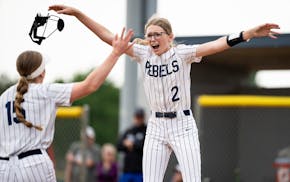
Champlin Park shuts out Rogers 1-0 to win Class 4A, Section 5 softball title

Twins affiliate rained out more than any team: 'Never seen anything like this'
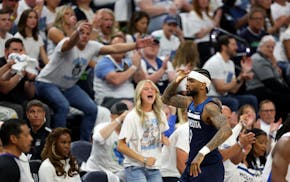
Three key Timberwolves players could enter free agent market
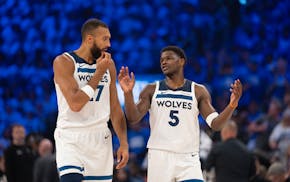
Souhan: If Edwards is a franchise player, he needs to act and play like it
